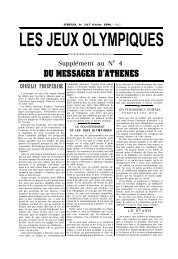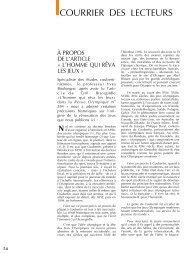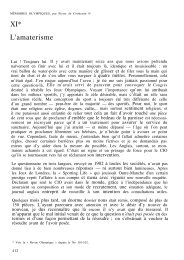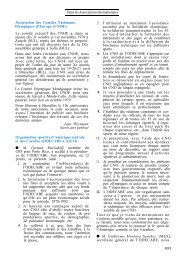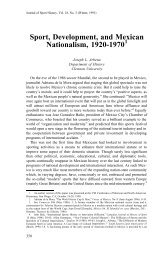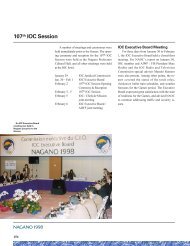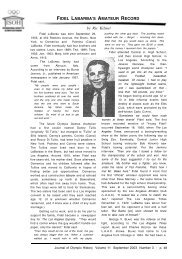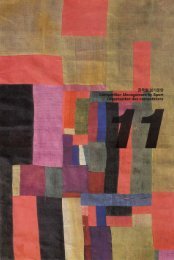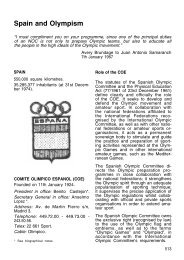Sport and Colonialism in 19th Century Australasia - LA84 Foundation
Sport and Colonialism in 19th Century Australasia - LA84 Foundation
Sport and Colonialism in 19th Century Australasia - LA84 Foundation
Create successful ePaper yourself
Turn your PDF publications into a flip-book with our unique Google optimized e-Paper software.
newspaper <strong>in</strong> 1882, <strong>in</strong> its lyrical treatment of rugby, presents<br />
a conv<strong>in</strong>c<strong>in</strong>g rationale for the game's acceptance by the Maoris:<br />
. . . every scrimmage is a h<strong>and</strong>-to-h<strong>and</strong> fight with all the<br />
excitement of battle <strong>and</strong> none of the bloodshed. Young<br />
fellows are tra<strong>in</strong>ed to run swiftly, to charge with<br />
bravery, to bear pa<strong>in</strong> silently, <strong>and</strong> to st<strong>and</strong> cold <strong>and</strong><br />
wet <strong>and</strong> other experiences common <strong>in</strong> warfare with<br />
stoicism. 21<br />
V<br />
The rituals, the Royal presence <strong>and</strong> the elitist traditions<br />
of the Ascot race meet<strong>in</strong>g are vivid examples of the manner <strong>in</strong><br />
which certa<strong>in</strong> sports <strong>and</strong> their locations became considerable<br />
symbols of status. To appear at Ascot's Royal Enclosure <strong>in</strong><br />
morn<strong>in</strong>g suit <strong>and</strong> top hat meant acceptance to the most aristocratic<br />
<strong>and</strong> <strong>in</strong>fluential circles of London society. Participation<br />
<strong>in</strong> the first eleven or fifteen at a "great" Public School<br />
had enormous life-long social status. To w<strong>in</strong> an Oxbridge row<strong>in</strong>g<br />
blue was the acme of social achievement. With<strong>in</strong> New Zeal<strong>and</strong><br />
there was a very real sensitivity to social differentiation.<br />
This is not to make a facile case of "all men be<strong>in</strong>g equal" <strong>and</strong><br />
happy with their status quo. There were clearly differences <strong>in</strong><br />
education, <strong>in</strong>come, <strong>and</strong> social aspiration. In the townships of<br />
the 1880s <strong>and</strong> the 1890s there were hill suburbs <strong>and</strong> "choice"<br />
locations that attracted a prosper<strong>in</strong>g, professional middle<br />
class. Nevertheless, <strong>in</strong> recreation <strong>and</strong> sport, there was not<br />
the snobbery, upper class English accent or exclusiveness associated<br />
with British "status sport". There was, however - <strong>and</strong><br />
this is critical to an underst<strong>and</strong><strong>in</strong>g of New Zeal<strong>and</strong> society -<br />
high status attached to athletic performance <strong>and</strong> adm<strong>in</strong>istrative<br />
ability <strong>in</strong> recreation <strong>and</strong> sport.<br />
The British <strong>in</strong> the n<strong>in</strong>eteenth century, lionised a number<br />
of figures such as the Duke of Well<strong>in</strong>gton, Deerfoot, General<br />
Gordon, Lilly Langtry, Capta<strong>in</strong> Webb, David Liv<strong>in</strong>gstone, Gladstone,<br />
W.G. Grace <strong>and</strong> so on. In a far off colony, such as New<br />
Zeal<strong>and</strong>, these figures were equally revered, renowned <strong>and</strong> idol-<br />
ised. The phenomenon is that there was a conscious rejection<br />
of such deification for outst<strong>and</strong><strong>in</strong>g New Zeal<strong>and</strong>ers<br />
<strong>in</strong> any field<br />
73



